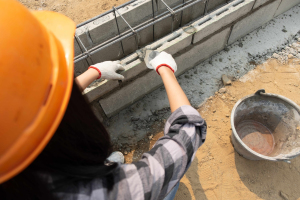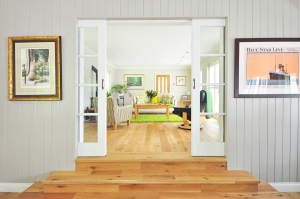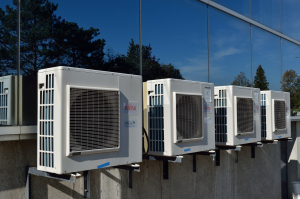When it comes to our homes, it’s easy to take certain parts for granted or focus on the more glamorous aspects of interior design. However, every part of a house, from the foundation to the roof, plays a vital role in creating a safe, comfortable, and functional living space. In this blog post, we’ll explore the importance of every component of a house and how each contributes to the overall well-being of its occupants.
Foundation: The Solid Base

The foundation is the unsung hero of your home, providing stability and preventing structural issues. A strong foundation ensures that your house can withstand environmental factors like earthquakes and soil settlement, guaranteeing your safety.
Tips to maintain your foundation:
- Keep the moisture level around your foundation consistent, since a foundation that is too wet or too dry can experience damage or weakness.
- Even if you don’t see cracks in the walls or foundation, you should still do regular foundation inspections at least twice per year. This will help you catch any minor problems before it escalates.
- If you have flowers planted beside the foundation, it is advisable to keep them short – shorter than 3 feet – as taller plants require more watering, which isn’t good for your foundation.
Read Also: How to choose the right type of flooring for different part of your home
Walls: Enclosure and Insulation
Walls not only divide rooms but also provide insulation, keeping your home comfortable year-round. Properly insulated walls contribute to energy efficiency, reducing heating and cooling costs. The most common wall materials are wood, brick, and concrete. Wood is easy to work with and relatively inexpensive.
Brick is more expensive but provides good insulation. Concrete is the most robust but expensive option. The wall must support loads and resist wind, earthquakes, and other forces. Critical considerations when choosing wall materials are:
- Insulation Requirements: If you live in a hot climate, you’ll need a material that provides good insulation. It prevents heat from entering the house and keeps it cool. You need a material that doesn’t lose heat quickly in a cold climate, keeping the house warmer. Excellent insulation materials are concrete, brick, and wood.
- Sound Transmission: You don’t want your walls to transmit sound easily. This is especially important if you live in a high-density area or near a busy street. Materials that block sound well are wood, brick, and concrete.
- Fire Resistance: Some materials are more fire-resistant than others, an essential consideration if you live in an area prone to wildfires. The most fire-resistant materials are concrete, brick, and steel.
- Moisture Resistance: The wall must resist moisture, vital in wet climates or if the house is near water. Materials that resist moisture well are brick, concrete, and steel. Note that the wall deteriorates, leading to leaks and other problems when wet.
- Cost: The cost of the material is an important consideration. The most expensive materials are concrete, brick, and steel, while wood is affordable.
Roof: Shelter from the Elements
A well-maintained roof protects your home from rain, snow, and harsh sunlight. It prevents water leaks and structural damage, maintaining the integrity of your house. The most important consideration when choosing a roofing material is the climate. Asphalt shingles are not suitable for areas with high winds or hail. Wood is not ideal for areas with high fire danger.
Windows and Doors: Natural Light and Ventilation/ Security and Privacy
Understanding the anatomy of a house involves recognizing the various components that make up a home. Windows serve as portals to natural light, ventilation, and scenic views, while doors provide access and security. Windows allow natural light to enter your home, reducing the need for artificial lighting during the day. They also provide ventilation, improving indoor air quality and comfort. Doors provide security and privacy. Quality doors and locks ensure the safety of your family and belongings.
Flooring: Comfort and Durability

The type of flooring you choose affects both aesthetics and functionality. Carpeting can provide comfort, while hardwood or tile floors offer durability and easy maintenance.The floor must be strong enough to support the weight of the house and everything in it. Not forgetting, it must also resist moisture and pests. The most common flooring materials are wood, concrete, tile, and carpet.
Plumbing: Convenience and Hygiene
Proper plumbing ensures a clean water supply and efficient wastewater removal. It’s the backbone of your kitchen, bathrooms, and laundry facilities, contributing to your daily comfort and hygiene. When choosing, consider the following:
- Water Efficiency: Toilets, shower heads, and faucets come in different water efficiency ratings. The higher the rating, the less water they use. To save water, choose fixtures with the highest water efficiency rating.
- Style and Durability: Choose a style that fits the overall design of your home. Durable fixtures might cost more but serve you for a more extended period. Brass, bronze, and stainless steel are more durable than plastic.
Electrical System: Powering Your Home
The electrical system is essential for lighting, appliances, and entertainment. Safety measures, like circuit breakers and grounding, are crucial to prevent electrical hazards. When choosing electrical fixtures, consider the following:
- Voltage and Current: Your home’s electric system must handle the voltage and current required by your appliances and lights. Most homes use 110-volt and 220 power. Some devices, such as stoves and clothes dryers, require 220-volt power. The central panel should have a label that indicates the maximum voltage and current it can handle.
- Energy Efficiency: Some electrical fixtures are more energy-efficient than others. LED light bulbs use less energy than incandescent light bulbs. When choosing electrical fixtures, look for the Energy Star label. It indicates that the appliance meets strict energy-efficiency guidelines.
- Safety: Correct electrical fixture installation ensures safety. Incorrectly installed ones can cause fires. Hire a qualified electrician to install all the electrical fixtures.
HVAC (Heating, Ventilation, and Air Conditioning): Climate Control

HVAC systems regulate indoor temperatures and air quality. They’re indispensable for creating a comfortable living environment year-round.
Conclusion:
Every part of a house plays a unique and vital role in creating a harmonious living space. Neglecting any component can lead to discomfort, safety hazards, and costly repairs. By appreciating the significance of each part of your home, you can make informed decisions when it comes to maintenance, renovations, or improvements.
Remember, it’s the combination of these elements that transforms a house into a comfortable and functional home.Your home is made up of many different elements, each with a specific purpose. The right choice affects your home’s appearance, energy efficiency, and safety. Consider all your options carefully before making a decision.
Even when the choices are overwhelming, remember that you are the one who will live in your home. Choose what makes you happy and comfortable
